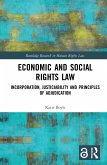Nico Moons (Belgium University of Antwerp)
The Right to housing in law and society
Nico Moons (Belgium University of Antwerp)
The Right to housing in law and society
- Broschiertes Buch
- Merkliste
- Auf die Merkliste
- Bewerten Bewerten
- Teilen
- Produkt teilen
- Produkterinnerung
- Produkterinnerung
This book offers a sociological perspective on the functioning of the right to housing in practice and provides insights useful for all types of housingâ and by extension socio-economicâ rights practitioners, advocates, and policymakers. It shows the latest state of knowledge on the topic and will be of interest to researchers, academics, pol
Andere Kunden interessierten sich auch für
![Human Rights, Digital Society and the Law Human Rights, Digital Society and the Law]() Human Rights, Digital Society and the Law65,99 €
Human Rights, Digital Society and the Law65,99 €![Economic and Social Rights Law Economic and Social Rights Law]() Katie Boyle (UK University of Roehampton)Economic and Social Rights Law64,99 €
Katie Boyle (UK University of Roehampton)Economic and Social Rights Law64,99 €![Economic and Social Rights Law Economic and Social Rights Law]() Katie Boyle (UK University of Roehampton)Economic and Social Rights Law196,99 €
Katie Boyle (UK University of Roehampton)Economic and Social Rights Law196,99 €![Non-Governmental Organisations and the Law Non-Governmental Organisations and the Law]() Domenico CaroleiNon-Governmental Organisations and the Law142,99 €
Domenico CaroleiNon-Governmental Organisations and the Law142,99 €![The Rohingya Crisis The Rohingya Crisis]() The Rohingya Crisis38,99 €
The Rohingya Crisis38,99 €![The Routledge Handbook on Extraterritorial Human Rights Obligations The Routledge Handbook on Extraterritorial Human Rights Obligations]() The Routledge Handbook on Extraterritorial Human Rights Obligations47,99 €
The Routledge Handbook on Extraterritorial Human Rights Obligations47,99 €![EU Private Law and the CISG EU Private Law and the CISG]() EU Private Law and the CISG45,99 €
EU Private Law and the CISG45,99 €-
-
-
This book offers a sociological perspective on the functioning of the right to housing in practice and provides insights useful for all types of housingâ and by extension socio-economicâ rights practitioners, advocates, and policymakers. It shows the latest state of knowledge on the topic and will be of interest to researchers, academics, pol
Hinweis: Dieser Artikel kann nur an eine deutsche Lieferadresse ausgeliefert werden.
Hinweis: Dieser Artikel kann nur an eine deutsche Lieferadresse ausgeliefert werden.
Produktdetails
- Produktdetails
- Routledge Research in Human Rights Law
- Verlag: Taylor & Francis Ltd
- Seitenzahl: 260
- Erscheinungstermin: 14. August 2020
- Englisch
- Abmessung: 229mm x 152mm x 14mm
- Gewicht: 394g
- ISBN-13: 9780367590437
- ISBN-10: 0367590433
- Artikelnr.: 60043156
- Herstellerkennzeichnung
- Libri GmbH
- Europaallee 1
- 36244 Bad Hersfeld
- gpsr@libri.de
- Routledge Research in Human Rights Law
- Verlag: Taylor & Francis Ltd
- Seitenzahl: 260
- Erscheinungstermin: 14. August 2020
- Englisch
- Abmessung: 229mm x 152mm x 14mm
- Gewicht: 394g
- ISBN-13: 9780367590437
- ISBN-10: 0367590433
- Artikelnr.: 60043156
- Herstellerkennzeichnung
- Libri GmbH
- Europaallee 1
- 36244 Bad Hersfeld
- gpsr@libri.de
Nico Moons is Doctor of Law at the University of Antwerp, Belgium
Introduction
1. International Acknowledgment of the Importance of Housing
2. Approach and Aims of the Book
3. The Belgian and Flemish Right to Housing as Illustration
PART I
An Effective Right to Housing: Beyond Legal-Technical Issues
1 Human Dignity: A Guiding Principle for a Stronger Right to Housing?
1. Exploring the Content of Human Dignity and Its Use in a Human Rights
Context
A. History of the Concept
B. Human Dignity in a Human Rights Context
1) First Function: A Foundation for Human Rights
2) Second Function: A Value/Right to Protect and Guarantee
C. The Added Value and Pitfalls of Using Human Dignity
1) As an Equivalent of Decent or Adequate Housing
2) As an Open-Ended Norm for Courts and Other Institutions
a. A Driving Force for Other Rights
b. The Other Side of the Coin: A Race to the Bottom?
c. Subjective vs. Objective Dignity
4. Impact on Economic, Social and Cultural Rights and the Right to Housing
A. Obligations of Result or Conduct? According to Private or International
Law?
B. A Recipe for Confusion
5. Towards Result-Oriented Obligations?
A. The Right to Housing as an Obligation of Result
B. A Result-Oriented Approach
6. Conclusion
5 Progressive Realization and Retrogressive Measures
1. Introduction
2. The Concept of Progressive Realization under Scrutiny: From a Housing
Rights Perspective
A. Progressiveness as a Flexibility Device
B. Flexibility Does Not Equal Freedom of Obligations
1) Drittwirkung
2) Immediate Obligations
3) Minimum Core
C. Focus on Progressiveness
3. Retrogressive Measures and Financial Constraints
A. Origins in International Human Rights Law
B. Justification of Retrogressive Measures in International Human Rights
Law
1) Presumption of Impermissibility
2) More Leeway for Budgetary Concerns?
3) Connection between Article 2(1) and 4 ICESCR
4) Budgetary Concerns: The Position of the European Committee of Social
Rights
C. The Application in Belgian Case Law
1) A Broader Margin of Appreciation: No Presumption of Non-Retrogression
2) Practical Problems: Establishing Retrogression
3) A Different Application of the Principle: The Proportionality Test
D. Appropriateness of Retrogressive Measures
4. Conclusion
6 Towards Result-Oriented Obligations
1. International Monitoring Techniques
2. Enforceability of Progressive Realization
A. A Review Criterion
B. Reasonableness
1) Different Scopes of Reasonableness
2) Reasonableness as Appropriateness
a. A Preliminary Proposal
b. Possible Criticism and Imperfections
3. Combining Monitoring and Reasonableness
A. Overview of the Proposal
B. Requirements and Areas of Concern
1) The Monitoring Body
2) Ex-Ante and Ex-Post Analysis: Practical Difficulties
3) Enforceability of Progress
5. Conclusion
Conclusions
Index
1. International Acknowledgment of the Importance of Housing
2. Approach and Aims of the Book
3. The Belgian and Flemish Right to Housing as Illustration
PART I
An Effective Right to Housing: Beyond Legal-Technical Issues
1 Human Dignity: A Guiding Principle for a Stronger Right to Housing?
1. Exploring the Content of Human Dignity and Its Use in a Human Rights
Context
A. History of the Concept
B. Human Dignity in a Human Rights Context
1) First Function: A Foundation for Human Rights
2) Second Function: A Value/Right to Protect and Guarantee
C. The Added Value and Pitfalls of Using Human Dignity
1) As an Equivalent of Decent or Adequate Housing
2) As an Open-Ended Norm for Courts and Other Institutions
a. A Driving Force for Other Rights
b. The Other Side of the Coin: A Race to the Bottom?
c. Subjective vs. Objective Dignity
4. Impact on Economic, Social and Cultural Rights and the Right to Housing
A. Obligations of Result or Conduct? According to Private or International
Law?
B. A Recipe for Confusion
5. Towards Result-Oriented Obligations?
A. The Right to Housing as an Obligation of Result
B. A Result-Oriented Approach
6. Conclusion
5 Progressive Realization and Retrogressive Measures
1. Introduction
2. The Concept of Progressive Realization under Scrutiny: From a Housing
Rights Perspective
A. Progressiveness as a Flexibility Device
B. Flexibility Does Not Equal Freedom of Obligations
1) Drittwirkung
2) Immediate Obligations
3) Minimum Core
C. Focus on Progressiveness
3. Retrogressive Measures and Financial Constraints
A. Origins in International Human Rights Law
B. Justification of Retrogressive Measures in International Human Rights
Law
1) Presumption of Impermissibility
2) More Leeway for Budgetary Concerns?
3) Connection between Article 2(1) and 4 ICESCR
4) Budgetary Concerns: The Position of the European Committee of Social
Rights
C. The Application in Belgian Case Law
1) A Broader Margin of Appreciation: No Presumption of Non-Retrogression
2) Practical Problems: Establishing Retrogression
3) A Different Application of the Principle: The Proportionality Test
D. Appropriateness of Retrogressive Measures
4. Conclusion
6 Towards Result-Oriented Obligations
1. International Monitoring Techniques
2. Enforceability of Progressive Realization
A. A Review Criterion
B. Reasonableness
1) Different Scopes of Reasonableness
2) Reasonableness as Appropriateness
a. A Preliminary Proposal
b. Possible Criticism and Imperfections
3. Combining Monitoring and Reasonableness
A. Overview of the Proposal
B. Requirements and Areas of Concern
1) The Monitoring Body
2) Ex-Ante and Ex-Post Analysis: Practical Difficulties
3) Enforceability of Progress
5. Conclusion
Conclusions
Index
Introduction
1. International Acknowledgment of the Importance of Housing
2. Approach and Aims of the Book
3. The Belgian and Flemish Right to Housing as Illustration
PART I
An Effective Right to Housing: Beyond Legal-Technical Issues
1 Human Dignity: A Guiding Principle for a Stronger Right to Housing?
1. Exploring the Content of Human Dignity and Its Use in a Human Rights
Context
A. History of the Concept
B. Human Dignity in a Human Rights Context
1) First Function: A Foundation for Human Rights
2) Second Function: A Value/Right to Protect and Guarantee
C. The Added Value and Pitfalls of Using Human Dignity
1) As an Equivalent of Decent or Adequate Housing
2) As an Open-Ended Norm for Courts and Other Institutions
a. A Driving Force for Other Rights
b. The Other Side of the Coin: A Race to the Bottom?
c. Subjective vs. Objective Dignity
4. Impact on Economic, Social and Cultural Rights and the Right to Housing
A. Obligations of Result or Conduct? According to Private or International
Law?
B. A Recipe for Confusion
5. Towards Result-Oriented Obligations?
A. The Right to Housing as an Obligation of Result
B. A Result-Oriented Approach
6. Conclusion
5 Progressive Realization and Retrogressive Measures
1. Introduction
2. The Concept of Progressive Realization under Scrutiny: From a Housing
Rights Perspective
A. Progressiveness as a Flexibility Device
B. Flexibility Does Not Equal Freedom of Obligations
1) Drittwirkung
2) Immediate Obligations
3) Minimum Core
C. Focus on Progressiveness
3. Retrogressive Measures and Financial Constraints
A. Origins in International Human Rights Law
B. Justification of Retrogressive Measures in International Human Rights
Law
1) Presumption of Impermissibility
2) More Leeway for Budgetary Concerns?
3) Connection between Article 2(1) and 4 ICESCR
4) Budgetary Concerns: The Position of the European Committee of Social
Rights
C. The Application in Belgian Case Law
1) A Broader Margin of Appreciation: No Presumption of Non-Retrogression
2) Practical Problems: Establishing Retrogression
3) A Different Application of the Principle: The Proportionality Test
D. Appropriateness of Retrogressive Measures
4. Conclusion
6 Towards Result-Oriented Obligations
1. International Monitoring Techniques
2. Enforceability of Progressive Realization
A. A Review Criterion
B. Reasonableness
1) Different Scopes of Reasonableness
2) Reasonableness as Appropriateness
a. A Preliminary Proposal
b. Possible Criticism and Imperfections
3. Combining Monitoring and Reasonableness
A. Overview of the Proposal
B. Requirements and Areas of Concern
1) The Monitoring Body
2) Ex-Ante and Ex-Post Analysis: Practical Difficulties
3) Enforceability of Progress
5. Conclusion
Conclusions
Index
1. International Acknowledgment of the Importance of Housing
2. Approach and Aims of the Book
3. The Belgian and Flemish Right to Housing as Illustration
PART I
An Effective Right to Housing: Beyond Legal-Technical Issues
1 Human Dignity: A Guiding Principle for a Stronger Right to Housing?
1. Exploring the Content of Human Dignity and Its Use in a Human Rights
Context
A. History of the Concept
B. Human Dignity in a Human Rights Context
1) First Function: A Foundation for Human Rights
2) Second Function: A Value/Right to Protect and Guarantee
C. The Added Value and Pitfalls of Using Human Dignity
1) As an Equivalent of Decent or Adequate Housing
2) As an Open-Ended Norm for Courts and Other Institutions
a. A Driving Force for Other Rights
b. The Other Side of the Coin: A Race to the Bottom?
c. Subjective vs. Objective Dignity
4. Impact on Economic, Social and Cultural Rights and the Right to Housing
A. Obligations of Result or Conduct? According to Private or International
Law?
B. A Recipe for Confusion
5. Towards Result-Oriented Obligations?
A. The Right to Housing as an Obligation of Result
B. A Result-Oriented Approach
6. Conclusion
5 Progressive Realization and Retrogressive Measures
1. Introduction
2. The Concept of Progressive Realization under Scrutiny: From a Housing
Rights Perspective
A. Progressiveness as a Flexibility Device
B. Flexibility Does Not Equal Freedom of Obligations
1) Drittwirkung
2) Immediate Obligations
3) Minimum Core
C. Focus on Progressiveness
3. Retrogressive Measures and Financial Constraints
A. Origins in International Human Rights Law
B. Justification of Retrogressive Measures in International Human Rights
Law
1) Presumption of Impermissibility
2) More Leeway for Budgetary Concerns?
3) Connection between Article 2(1) and 4 ICESCR
4) Budgetary Concerns: The Position of the European Committee of Social
Rights
C. The Application in Belgian Case Law
1) A Broader Margin of Appreciation: No Presumption of Non-Retrogression
2) Practical Problems: Establishing Retrogression
3) A Different Application of the Principle: The Proportionality Test
D. Appropriateness of Retrogressive Measures
4. Conclusion
6 Towards Result-Oriented Obligations
1. International Monitoring Techniques
2. Enforceability of Progressive Realization
A. A Review Criterion
B. Reasonableness
1) Different Scopes of Reasonableness
2) Reasonableness as Appropriateness
a. A Preliminary Proposal
b. Possible Criticism and Imperfections
3. Combining Monitoring and Reasonableness
A. Overview of the Proposal
B. Requirements and Areas of Concern
1) The Monitoring Body
2) Ex-Ante and Ex-Post Analysis: Practical Difficulties
3) Enforceability of Progress
5. Conclusion
Conclusions
Index








